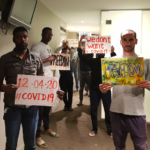The Magistrate Refused My Section 14 Mental Health Application – What Now?

If you are charged with a criminal offence and suffer from a mental health impairment or a cognitive impairment, and your case is being dealt with in the Local Court, you may be able to make an application for the charges to be dismissed on condition you enter a mental health treatment plan for up to 12 months.
These applications are made under section 14 of the of the Mental Health and Cognitive Impairment Forensic Provisions Act 2020, and divert those who suffer from certain mental health impairments or cognitive impairments into treatment and away from the criminal justice system.
If you make a successful section 14 application, you will be discharged with no conviction and no finding of guilt, and it will stay that way provided you compete the treatment plan.
There are a number of misconceptions in the legal profession and among magistrates and police officers that a section 14 order is an easy way for offenders to avoid conviction.
This means that magistrates can be sceptical and it can be difficult to convince them to issue a section 14 order.
Having the right criminal lawyer can make a big difference to your chance of success, and if you are refused, there are still options available to you.
Why would I be refused a Section 14?
There are a number of reasons a magistrate might refuse to grant a section 14.
You will need to meet each of the criteria under Section 14 to make a successful application; including:
1. Suffering from a relevant ‘mental health impairment or a cognitive impairment’,
2. Having a case that is ‘appropriate’ to be dealt with under section 14, and
3. Having a suitable ‘treatment plan’.
First of all, there are specific criteria as to what types of mental health or cognitive impairments warrant the order, and it can sometimes be complex when there are multiple issues or drug and alcohol problems mixed in as well.
Secondly, to grant a section 14 order, the magistrate will need to determine that it’s more appropriate to deal with your matter under a section 14 than by the usual methods of punishment
It will only be more appropriate to make the order if it is in the public interest, as opposed to the interests of the person making the application.
The court will take a number of different factors into consideration when making this decision, including the seriousness of the offence, the extent and relevance of the mental health impairments, and the need to deter other from committing offences of that type.
Thirdly, there will need to be a suitable treatment plan for a period of up to 12 months.
It’s important to seek experienced legal advice if you think a section 14 might be appropriate for you.
However, if you are unsuccessful and your section 14 application is refused you can appeal or in some cases make another application.
Making a second application
There is technically no limit on the number of applications you can make in the local court and you can do this at any stage of the proceedings.
If you are refused a section 14, you can reapply, although unless there is significant new evidence to support your application or a reasonable amount of time has passed, it may be unlikely you will succeed.
In some circumstances, for instance if you have been complying with a treatment plan which has shown benefits for some time, a second application may be successful.
If you decide to plead not guilty after having a section 14 refused, the matter will progress to a defended hearing, which is when witnesses are called to take the stand and the magistrate decides whether you are guilty or not guilty.
If you decide to plead guilty, the matter will proceed to a sentencing hearing – which is when the magistrate will decide the appropriate penalty.
Appealing to the District Court
It is also possible to appeal against a Local Court magistrate’s decision to refuse your section 14 application to the District Court.
An appeal must be filed in the District Court within 28 days of the Local Court case being finalised, unless the interests of justice call for an extension, in which case the District Court can grant leave (permission) to file it up to three months after the finalisation of the case in the Local Court.
The District Court will hear the case afresh, and can decide to grant the section 14 application despite it being refused in the Local Court.
So being refused a section 14 application does not necessarily shut-the-gates to an order being made at a later date.
If you have been refused a section 14, its best to make sure that you seek legal advice from an experienced criminal lawyer who has a good track record of successfully obtaining Section 14 orders for clients.






